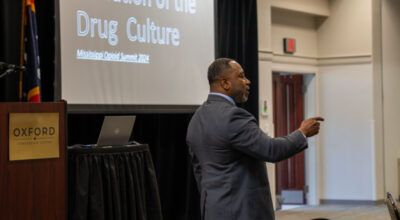Rivers McGraw Act now in Senate
Published 9:54 am Thursday, March 2, 2017
A bill that would require parents to be notified before anyone under 21 could be granted bond after being arrested for drugs or driving under the influence is now in the hands of the Senate.
House Bill 1089 was passed unanimously by the House on Feb. 23 and pushed through to the Senate.
The bill, named the Rivers McGraw Act, is now on the Senate calendar to be voted on the floor whenever Lt. Gov. Tate Reeves calls it for a vote.
If passed, the bill was originally set to go into law on July 1; however, Senate Judiciary Committee A placed a reverse repealer on the bill which sets the repeal date as the day before the law is to take effect. It’s usually done when the Senate feels there needs to be more work done to the bill and goes back to a conference committee without outright killing the bill.
Family backs bill
The bill was introduced by Rep. Andy Gipson on behalf of Lauren McGraw, the mother of Rivers McGraw, a University of Mississippi student from Madison who committed suicide in November, three hours after being arrested for his second DUI since 2015.
Lauren McGraw says her son was bonded out by a friend and she was never notified of the arrest. After she heard, she got in her car, headed to Oxford. But before reaching Oxford she received a phone call telling her Rivers had taken his own life.
“They arrest kids under 21 for possessing alcohol, public drunkenness, and call them minors, but then they don’t contact their parents,” McGraw said. “My son would absolutely be alive today if I had been contacted by police. I believe that with all my heart.”
In December, Madison Municipal Judge Dale Danks mandated that anyone under 21 arrested for drugs or DUI would be held up to 48 hours until a parent could be reached. Then McGraw took her fight to the Legislatures to make the law a state law.
The bill, however, would require the minor to be held up to eight hours until a parent can be contacted. Should it not be feasible for a parent to appear personally because of distance or other circumstances, law enforcement personnel would take reasonable steps to determine that a parent was notified and concurs with the release of the defendant. An attorney acting on behalf of the defendant’s parents can also arrange bail.
If a parent cannot be reached, the defendant would go before a judge after eight hours where bail will be set.
Police not in favor
The age of majority is 21 in Mississippi; however, those18 are considered adults in some instances. They can enter into contracts and are considered adults for criminal purposes at 18 – which is one reason why the Mississippi Association of Chiefs of Police is not in support of the bill, according to Oxford Police Chief Joey East, who also serves as MACP president.
East said the bill needs more clarification as to whether “arrest” means any arrests, misdemeanor or felony or custodial or noncustodial.
“The bill says ‘If a person under the age of 21 is arrested for an offense,’ of drugs or DUI, bail won’t be granted unless a parent can be reached,” East said. “It doesn’t say felony or misdemeanor. People charged with DUI are arrested anyway, but if we find someone with a small amount of marijuana on them, we generally give them a citation to go to court. It’s a noncustodial arrest. Will we have to now start actually bringing them to jail? It’s unclear.”
East said it will put more responsibility on the detention center to determine if they’ve actually spoken to a parent and not a friend of the defendant’s pretending to be a parent.
East said there’s also a conflict of what constitutes a minor since those 18 and above are considered adults when involved with criminal activity.
“If someone is 19 or 20 and in the military, served in Iraq for a year and comes home and does something stupid, are we going to call mom and dad?” East questioned. “What if they’re married?”
East said it costs Oxford $35 each time someone is brought to the jail.
“What happened to Rivers is a horrible thing, and my heart goes out to his mother and his family,” East said. “But it’s just not good legislation at this point. There’s good meaning behind it. But we are punishing and traumatizing more young people by doing it this way. What we need are more mental health resources to handle situations like Rivers’.”
Mom disappointed with MACP
Rivers had been dealing with drug and alcohol abuse for a few years but McGraw said she felt her son was making progress. However, on Nov. 10, he used Xanax, cocaine and alcohol, a combination that often leaves the user in a “dark place,” McGraw said.
She said she’s disappointed in MACP’s decision not to back the bill.
“They have fought this bill from behind the scene,” McGraw said Wednesday. “They should have come and talked to us and let us know what wording they had concerns with.”
McGraw said if only a citation is issued, it’s not an arrest and that OPD or any law enforcement wouldn’t have to change anything that they’re doing now and that the only change comes when the defendant is brought to jail.
“We could have talked about changes before the bill got this far,” McGraw said.
McGraw said people under 21 generally are in school or on their parent’s insurance and their actions generally come back to be the parents’ responsibility ultimately anyway.
“In Mississipi, they’re minors until they’re 21,” she said. “If they are in trouble, the parents should be told. If I had been notified, I could have gotten Rivers help that day.”





